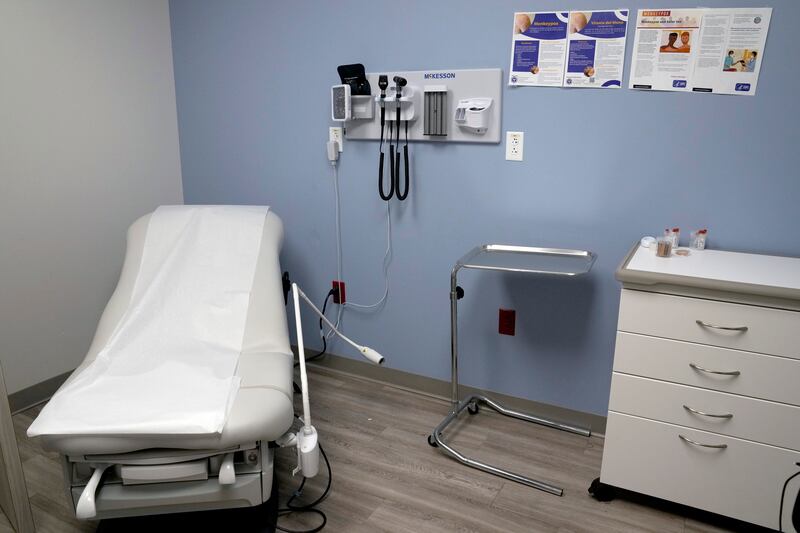Pregnant employees in most U.S. businesses are entitled to certain accommodations, whether that means limits on how much they’re required to lift, extra bathroom breaks or time off for doctor appointments, among others.
And under the Pregnant Workers Fairness Act, workers could qualify for time off to seek or recover from an abortion, U.S. Equal Employment Opportunity Commission Chair Charlotte A. Burrows told reporters during a briefing about the final rule, which was released Monday.
Burrows said the rule is designed so the accommodation is individualized, targeted to the woman but worked out through good communication between boss and worker. The only exception to making reasonable accommodation is if the employer can show that it places an undue burden on the business. The rule will be published in the Federal Register on Friday and will become effective in mid-June.
“This closes the gap,” said Burrows, who called the act a “huge step forward for women, working families and our economy.”
On a Zoom call, Burrows said that abortion would be treated like any other pregnancy-related condition.
Covering the cost of any of the accommodations is not required by the act, so any time off would be unpaid unless a company had its own policy that covered that expense.
Burrows said the act applies to companies with at least 15 employees and requires them to make “reasonable accommodations” to pregnant workers so they can continue to do their job. She cited a case the EEOC received a complaint about where a woman was forced to quit to get emergency medical care. She miscarried later that day. In a different case the EEOC has tackled, a pregnant employee was told by her supervisor that she could sit down occasionally during her shift. Then she got a different supervisor and that accommodation was removed. When she balked, she was transferred to another department, had her hours reduced and was later fired.
That kind of thing, Burrows said, “happens all too often,” which is why Congress easily passed the act to protect pregnant women in late 2022. The EEOC was directed to create the final rule so that employees and their bosses had some direction and clarity. She said the only protection pregnant workers previously had was through the Americans with Disability Act — and then only if their challenge was severe enough to qualify as a disability.
Accommodations are temporary
Pregnancy itself is temporary and so is the protection afforded by the Pregnant Workers Fairness Act, which expands on the Civil Rights Act of 1964.
Under the law, protected circumstances are deemed temporary, though how much time is needed in reasonable accommodation depends on what the issue is. Pregnancy typically runs less than 40 weeks, but needs for a traditional delivery, miscarriage or C-section could be very different and very individualized. The final rule doesn’t specify an accommodation length of time, but provides “clear considerations the employer can take into account,” Burrows said.
The commission began accepting complaints under the act in June, and also received over 100,000 public comments as part of its comment period. The Associated Press reported that many of those were about abortion, with 54,000 urging the commission not to include abortion in the protections, while another 40,000 said to please include it.
In a news release, the commission said reasonable accommodations could include “additional breaks to drink water, eat or use the restroom; a stool to sit on while working; time off for health care appointments; temporary reassignment; temporary suspension of certain job duties; telework; or time off to recover from childbirth or a miscarriage, among others.”
The rule also clarifies that an employer does not have to ask for supporting documentation when a pregnant employee requests reasonable accommodation. That boss’ request itself should only be made if it’s “reasonable” to do so.
The rule also explains how employers can assert defenses or ask for exemptions, including religious exemptions, which should be sought “as early as possible in charge processing.”
Including abortion in the rule
According to The Associated Press, the law “passed with robust bipartisan Congressional support in December 2022 but sparked controversy last year when the Equal Employment Opportunity Commission included abortions in its draft rules. The language means that workers can ask for time off to obtain an abortion and recover from the procedure.”
Per the article, “The EEOC says its decision to keep the abortion provisions in its final rules despite criticism from some conservatives is consistent with its own longstanding interpretation of Title VII, as well as court rulings. The federal agency added that the new law does not obligate employers or employer-sponsored health plans to cover abortion-related costs, and that the type of accommodation that most likely will be sought under the Pregnant Workers Fairness Act regarding an abortion is time off to attend a medical appointment or for recovery, which does not have to be paid.”
For more information on the act, visit the “What You Should Know about the Pregnant Workers Fairness Act” webpage.


